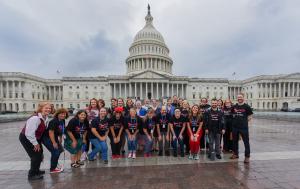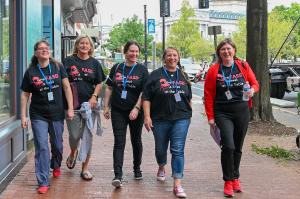U.S. House Passes FASD Authorization in the Support Act: Legislation Will Deliver Support to Individuals with FASD
Historic Congressional action marks milestone in FASD policy and moves community closer to achieving comprehensive Federal response to FASD
WASHINGTON, DC, DC, UNITED STATES, June 4, 2025 /EINPresswire.com/ -- Today marks a milestone in Fetal Alcohol Spectrum Disorders (FASD) policy as the U.S. House of Representatives passed FASD authorizing language, which was part of the SUPPORT for Patients and Communities Reauthorization Act of 2025 (HR.2483). This historic action moves the FASD community ever closer to achieving a comprehensive Federal response to FASD, but the work continues until FASD supports are written into law.
FASD describes the range of lifelong physical, mental, and behavioral effects that can occur in an individual prenatally exposed to alcohol. An estimated 1 in 20 Americans are affected by FASD, most of whom are not diagnosed.
The authorizing language, The FASD Respect Act, has been a several years long bi-partisan effort led by Betty McCollum (D-MN) and Don Bacon (R-NE) in the House and Lisa Murkowski (R-AK) and Amy Klobuchar (D-MN) in the Senate to address FASD on the national level and positively impact the lives of people across the country living with FASD and prenatal substance exposure.
Self-advocate and parent Carl Young from North Dakota says, “This is truly an exciting moment for the FASD Community. FASD is not rare. We know that nearly every classroom likely includes a child affected by FASD. While our work is far from finished, we just moved one step closer to the goal line.”
The legislation will provide much-needed national focus and support for FASD prevention and support to those with FASD. Specifically, it will allow the U.S. Department of Health and Human Services to promote and fund FASD education and awareness, and promotion of FASD-informed services, as well as resources to States and Tribes to address FASD in their existing systems of care.
Susan Shepard Carlson, past FASD United Board Chair, retired juvenile court justice, and former First Lady of Minnesota, says, “In the annals of FASD advocacy over the years, the passage of FASD authorization by the U.S. House of Representatives is truly historic and a huge victory for the FASD field. This would not have happened without the bi-partisan leadership in the House and the Senate, and the united effort of so many advocates around the country.”
FASD United is a public health advocacy nonprofit organization that serves as the national hub for FASD. FASD United is dedicated to empowering people living with FASD and prenatal substance exposure to educate systems of care and the public, enact policies, and unite communities everywhere.
For more information, visit www.FASDUnited.org.
The FASD United Family Navigator program provides individuals with FASD and their families with support and referrals.
The FASD United Affiliate Network is a group of organizations united to improve outcomes for those affected by FASD.
Jennifer Wisdahl
FASD United
+1 202-785-4585
wisdahl|fasdunited.org| |wisdahl|fasdunited.org
Visit us on social media:
LinkedIn
Bluesky
Instagram
Facebook
YouTube
X
Other
Legal Disclaimer:
EIN Presswire provides this news content "as is" without warranty of any kind. We do not accept any responsibility or liability for the accuracy, content, images, videos, licenses, completeness, legality, or reliability of the information contained in this article. If you have any complaints or copyright issues related to this article, kindly contact the author above.
Renowned Keyhole Neurosurgeon Dr. Mohana Rao Patibandla Inspires at TEDx Mumbai with Vision for Accessible Healthcare
Accounts Payable Automation Transforms USA Retail Finance with Faster, Accurate Processing
Civil Engineering Services Help Construction Firms Streamline Compliance and Design
Więcej ważnych informacji
 Jedynka Newserii
Jedynka Newserii

 Jedynka Newserii
Jedynka Newserii

Handel

1 października ruszy w Polsce system kaucyjny. Część sieci handlowych może nie zdążyć z przygotowaniami przed tym terminem
Producenci, sklepy i operatorzy systemu kaucyjnego mają niespełna dwa miesiące na finalizację przygotowań do jego startu. Wówczas na rynku pojawią się napoje w specjalnie oznakowanych opakowaniach, a jednostki handlu powinny być gotowe na ich odbieranie. Część z nich jest już do tego przygotowana, część ostrzega przed ewentualnymi opóźnieniami. Jednym z ważniejszych aspektów przygotowań na te dwa miesiące jest uregulowanie współpracy między operatorami, których będzie siedmiu, co oznacza de facto siedem różnych systemów kaucyjnych.
Ochrona środowiska
KE proponuje nowy cel klimatyczny. Według europosłów wydaje się niemożliwy do realizacji

Komisja Europejska zaproponowała zmianę unijnego prawa o klimacie, wskazując nowy cel klimatyczny na 2040 roku, czyli redukcję emisji gazów cieplarnianych o 90 proc. w porównaniu do 1990 rok. Jesienią odniosą się do tego kraje członkowskie i Parlament Europejski, ale już dziś słychać wiele negatywnych głosów. Zdaniem polskich europarlamentarzystów już dotychczas ustanowione cele nie zostaną osiągnięte, a europejska gospodarka i jej konkurencyjność ucierpi na dążeniu do ich realizacji względem m.in. Stanów Zjednoczonych czy Chin.
Handel
Amerykańskie indeksy mają za sobą kolejny wzrostowy miesiąc. Druga połowa roku na rynkach akcji może być nerwowa

Lipiec zazwyczaj jest pozytywnym miesiącem na rynkach akcji i tegoroczny nie był wyjątkiem. Amerykańskie indeksy zakończyły go na plusie, podobnie jak większość europejskich. Rynki Starego Kontynentu nie przyciągają jednak już kapitału z taką intensywnością jak w pierwszej części roku. Z drugiej strony wyceny za oceanem po kolejnych rekordach są już bardzo wysokie, a wpływ nowego porządku celnego narzuconego przez Donalda Trumpa – na razie trudny do przewidzenia. W najbliższym czasie na rynkach można się spodziewać jeszcze większej zmienności i nerwowości, ale dopóki spółki pokazują dobre wyniki, przesłanek do zmiany trendu na spadkowy nie ma.
Partner serwisu
Szkolenia

Akademia Newserii
Akademia Newserii to projekt, w ramach którego najlepsi polscy dziennikarze biznesowi, giełdowi oraz lifestylowi, a także szkoleniowcy z wieloletnim doświadczeniem dzielą się swoją wiedzą nt. pracy z mediami.




![Nestlé w Polsce podsumowuje wpływ na krajową gospodarkę. Firma wygenerowała 0,6 proc. polskiego PKB [DEPESZA]](https://www.newseria.pl/files/1097841585/fabryka-nesquik_1,w_85,r_png,_small.png)




.gif)

 |
| |
| |
|